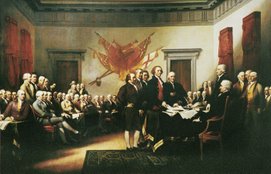
Adams: Will you be a patriot? Or a lover?
Jefferson: A lover!
When Thomas Jefferson came courting, Martha Wayles Skelton at 22 was already a widow, an heiress, and a mother whose firstborn son would die in early childhood. Family tradition says that she was accomplished and beautiful--with slender figure, hazel eyes, and auburn hair--and wooed by many. Perhaps a mutual love of music cemented the romance; Jefferson played the violin, and one of the furnishings he ordered for the home he was building at Monticello was a "forte-piano" for his bride.
They were married on New Year's Day, 1772, at the bride's plantation home "The Forest," near Williamsburg. When they finally reached Monticello in a late January snowstorm to find no fire, no food, and the servants asleep, they toasted their new home with a leftover half-bottle of wine and "song and merriment and laughter." That night, on their own mountaintop, the love of Thomas Jefferson and his bride seemed strong enough to endure any adversity
The birth of their daughter Martha in September increased their happiness. Within ten years the family gained five more children. Of them all, only two lived to grow up: Martha, called Patsy, and Mary, called Maria or Polly.
The physical strain of frequent pregnancies weakened Martha Jefferson so gravely that her husband curtailed his political activities to stay near her. He served in Virginia's House of Delegates and as governor, but he refused an appointment by the Continental Congress as a commissioner to France.
Just after New Year's Day, 1781, a British invasion forced Martha to flee the capital in Richmond with a baby girl a few weeks old--who died in April. In June the family barely escaped an enemy raid on Monticello. She bore another daughter the following May, and never regained a fair measure of strength. Jefferson wrote on May 20 that her condition was dangerous. After months of tending her devotedly, he noted in his account book for September 6, "My dear wife died this day at 11:45 A.M." (from www.whitehouse.gov)
WHAT'S IN A NAME?
Virginia is not simply Virginia but the Commonwealth of Virginia. . Named after Queen Elizabeth I of England, who was known as the Virgin Queen.
The English noun Commonwealth dates originally from the fifteenth century. The original phrase "common wealth" or "the common weal" comes from the old meaning of "wealth" which is "well-being" (Merriam-Webster word of the day, Jul 22,2006).
The term literally meant "common well-being". Thus commonwealth originally meant a state governed for the common good as opposed to an authoritarian state governed for the benefit of a given class of owners.
Virginia is known as the "Mother of Presidents", because it is the birthplace of eight U.S. presidents (George Washington, Thomas Jefferson, James Madison, James Monroe, William Henry Harrison, John Tyler, Zachary Taylor, and Woodrow Wilson), exceeded by no other state. Most of the United States' early presidents were from the state.
Virginia has also been known as the "Mother of States", because portions of the original Colony subsequently became Kentucky, Indiana, Illinois, and West Virginia as well as some portions of Ohio. Additionally, most of what is now Wisconsin and MICHIGAN was also briefly claimed by Virginia during the Revolutionary War.
Today, Virginia's slogan is "Virginia Is For Lovers!". The slogan itself has an interesting history:
If ever a year needed a dose of love it was 1969. Helicopter gun ships swooped in low on Vietnamese villages, hundreds of thousands of protesters rioted across the nation against the war, and for the first time during the Vietnam War 100 American combat deaths were reported in one week. “All we are saying, is give peace a chance,” sang John Lennon. During that long, hot summer the Manson gang struck in California, and Hurricane Camille devastated the Mississippi Gulf Coast and parts of Virginia.
In 1969, the symbol of the prosperous 1950s -- Dwight D. Eisenhower -- died, as did Ho Chi Minh, president of North Vietnam, and singer Judy Garland. Americans were reading The Godfather and Portnoy’s Complaint and watching Easy Rider, Bullitt and Butch Cassidy and the Sundance Kid at the movies. Johnny Cash sang A Boy Named Sue; and Hair debuted, forever changing Broadway’s dress code. The “Miracle Mets” won the World Series, and Neil Armstrong walked on the moon. It was “The Age of Aquarius.”
That year Robin McLaughlin, a $100-a-week copywriter for a Richmond ad agency, came up with an idea - that “Virginia is for Lovers.” Virginia was for lovers of beaches, mountains, horses, history - even each other - and there was the rub. “Free love” was a catchphrase of the time, when rebellious youth were changing the rules of courtship, and anxious tourism officials were skeptical about using a potentially controversial phrase.















